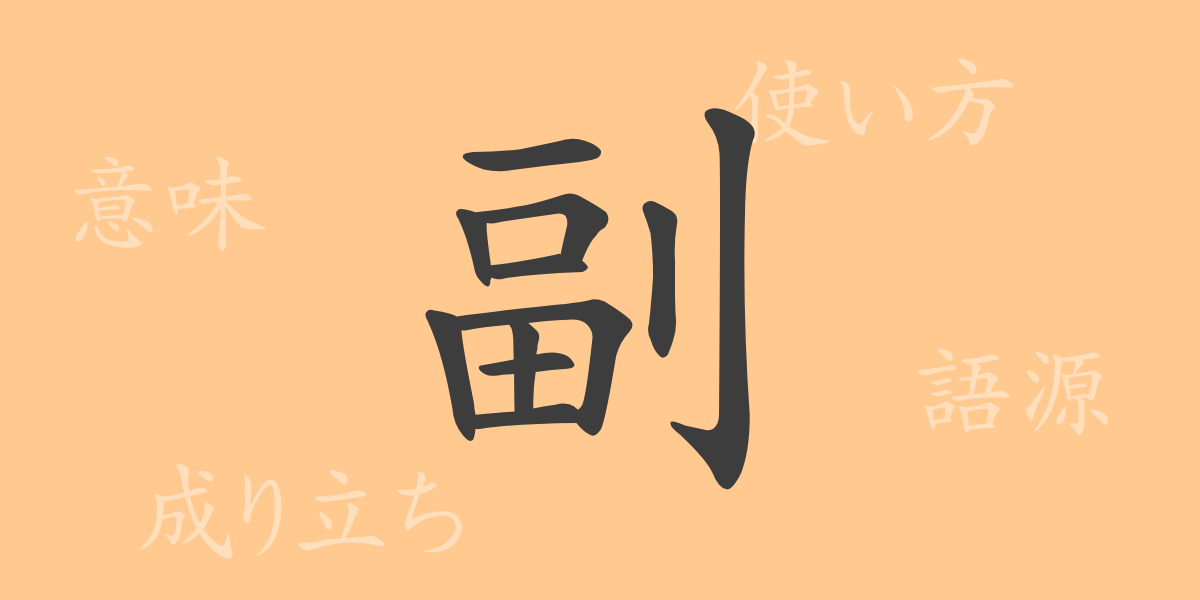The rich world of Japanese expression is deeply intertwined with 常用漢字(jouyou kanji), the commonly used Chinese characters. Among these, the kanji “副(fuku)” is widely utilized in our daily lives and business scenes. In this article, we will explore the profound world of the character “副(fuku),” delving into its etymology and modern usage. Join us on a journey to deepen your understanding of the Japanese language.
The Etymology of 副(fuku)
The kanji “副(fuku)” originated in ancient China, formed from the combination of “刀(tou)” (knife) and “畐(fuku)” (a character meaning container, which signifies filling something). Adding “刀(tou)” to “畐(fuku)” infuses the original meaning with the concepts of “dividing” and “splitting,” establishing “副(fuku)” as a notion referring to supplementary or secondary elements.
The Meaning and Usage of 副(fuku)
The kanji “副(fuku)” encompasses the original meanings of “dividing” and “splitting,” as well as the roles of assistance, secondary status, and subsequent rank. It is used to express concepts that, while not primary, hold significant roles, such as in “副業(fukugyou)” (side job), “副作用(fukusayou)” (side effect), and “副賞(fukushou)” (additional prize). Additionally, it appears in grammatical terms like “副詞(fukushi)” (adverb), making it an indispensable character for understanding Japanese.
Readings, Stroke Count, and Radicals of 副(fuku)
The kanji “副(fuku)” has the on’yomi (音読み, Chinese reading) “フク(fuku)” and the kun’yomi (訓読み, Japanese reading) “そえる(soeru)” and “そっくり(sokkuri).” It consists of 12 strokes and belongs to the 刀部(とうぶ, toubu) radical, with “刀(tou)” serving as the radical for classification purposes.
- Readings: On’yomi “フク(fuku),” Kun’yomi “そえる(soeru),” “そっくり(sokkuri)”
- Stroke Count: 12 strokes
- Radical: 刀部(とうぶ, toubu)
Idioms, Phrases, and Proverbs Using 副(fuku)
There are numerous idioms, phrases, and proverbs in Japanese incorporating “副(fuku).” “副作用(fukusayou)” refers to effects other than the primary effect of a drug, “副業(fukugyou)” denotes work done in addition to one’s main job, and “副賞(fukushou)” indicates an additional prize given alongside the main prize. The proverb “副を持たず(fuku wo motazu)” is used metaphorically to mean not getting involved in unnecessary matters. These expressions enrich the nuances of the Japanese language.
Summary of 副(fuku)
Through this article, we have explored the etymology, modern usage, readings, and idioms of the kanji “副(fuku).” It is a crucial character signifying supplementary or secondary elements and is essential for deepening your understanding of Japanese. Mastering its usage in daily life and business contexts enables more precise expression. As one of the 常用漢字(jouyou kanji), make sure to master its applications.

























